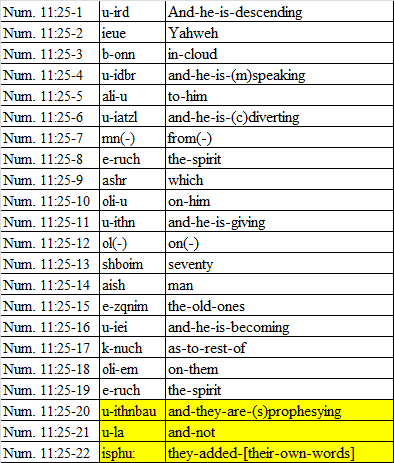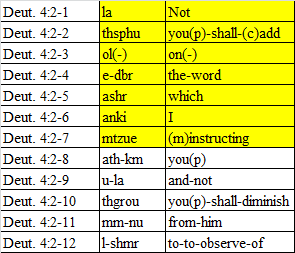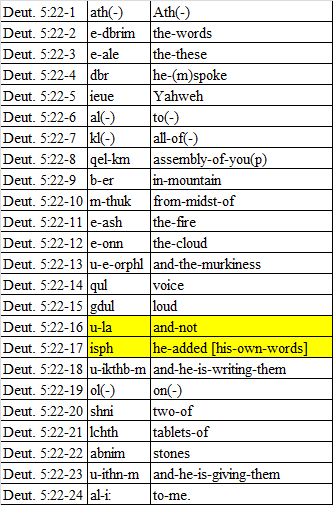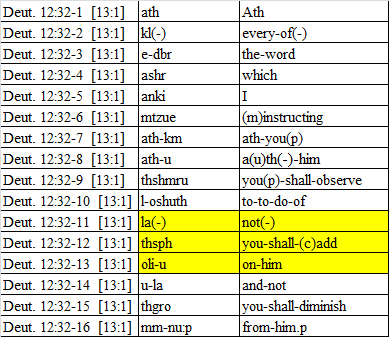As I am studying, I have encountered different renderings of the last phrase in this verse, which describes the prophesying of the seventy elders of Israel after the Spirit was placed on them. An initial search has shown me that the KJV reads "and did not cease" while the ESV, NASB and a few others read, "but they did not do it again." These phrases are apparently opposite in intent from one another. I can read both in the context of the events surrounding Moses needing help managing the people of Israel and see how either way is possible, but I'm wondering if there are reasons why the modern translators have all seemed to go with the second rendering—even the NKJV.
5 Answers
Part 1 – The ambiguity
ולא יספו, ve'lo yasafu
“ve'lo” means: “and didn't/weren't”
The suffix “-u” means “they”
Without knowing the meaning of the word yasaf, we have “and they didn't/weren't ... [yasaf]”
The meaning of yasaf is ambiguous and can come from one of two Hebrew roots: אספ, asaf of יספ, yasaf. [Strongs H3254 and H622]
Asaf means “to gather,” yasaf means “to increase.” “And they weren't gathered” means they weren't gathered in from their act of prophesying, which means they didn't cease prophesying. “And they didn't increase” would mean they didn't continue prophesying (asaf can be rendered as yasaf in a future tense conjugation).
There are two types of ambiguities that arise when translating a text from one language to another:
- Ambiguities that arise from an insufficient understanding of the original text
- Fundamental ambiguities that are inherent in the original texts itself
This yasaf/asaf ambiguity does not derive from our ignorance of the Hebrew language, or Biblical grammar or some unknowable cultural reference. In all likelihood, this is an example of a fundamental ambiguity which was also ambiguous to the original readers of the Bible.
In literature and in the Bible, ambiguity may be intentional. Intentional ambiguity is when an excess or multiplicity of meanings contribute to the literary effect and overall experience of a text.
Part 2 – What is going on in Numbers 11?
It is not easy to fully appreciate intentional ambiguity. To understand what is happening in 11:25 and why the asaf/yasaf ambiguity is probably an intentional and highly effective literary device, requires a careful reading of the wider literary context.
The Numbers narrative (the whole book minus the legal parts) can be divided into two distinct sections. Part 1 is exciting, optimistic, uplifting, promising, hopeful, etc. Part 2 is depressing, hopeless and profoundly tragic.
The book of Numbers opens after the people of Israel left Egypt, and received the Ten Commandments at Mount Sinai. It's now one year since the Exodus and the people are ready to conquer the land of Israel and establish themselves as a nation. The magnitude of this moment is captured in long descriptions of the Israelite encampment and the methods by which they travel. The opening ten chapters can be outlined as follows:
- The counting of the people (chapter 1)
- A detailed description of the flags and people's encampment (chapter 2)
- A description of how the Leviites will travel with the Tabernacle (chapters 3 – 4)
- Legal sections which adds to the tension and excitement of the moment (chapters 5 – 6)
- Preparation of the Tabernacle for traveling (chapter 7)
- Consecration of the Leviites (chapter 8)
- Celebration of the passover holiday (9:1 – 5) (the entering of the land of Israel in the second year of the Exodus from Egypt was supposed to happen immediately after the celebration of passover and directly parallel to the Exodus itself.)
- A slight delay in the schedule because of people who weren't able to celebrate the Passover at its proper time (9:9 – 14)
- The Israelites travel by the direction of the divine cloud which encompasses the Tabernacle (9:15 – 23)
- A commandment to make trumpets to alert the people of the camp's movement (10:1 – 10)
- A description of the people's movement (10:11 – 28)
- A strange dialog between Moses and his uncle foreshadowing the impending disappointments (10:25 – 34)
- “"Rise up, LORD, and let Thine enemies be scattered...” the optimism and hopefulness is palpable to the reader who sees the nation at the precipice of entering into their land (10:35 – 36)
The rest of the book of Numbers from chapter 11 and on, like so much of the Bible, is a story of complete and utter failure. Subsequent chapters will recount complaints, delays, death and punishments which culminates in a forty year sojourn in the desert and the death of the entire nation that originally left Egypt. Now we come to the turning point of this book (11:1-10):
And when the people complained, it displeased the LORD; and the LORD heard it, and His anger was kindled. And the fire of the LORD burned among them, and consumed those who were in the uttermost parts of the camp. And the people cried unto Moses; and when Moses prayed unto the LORD, the fire was quenched. And he called the name of the place Taberah [that is, a burning], because the fire of the LORD burned among them. And the mixed multitude that was among them fell to lusting. And the children of Israel also wept again and said, "Who shall give us flesh to eat? We remember the fish which we ate in Egypt freely, the cucumbers, and the melons, and the leeks, and the onions, and the garlic; but our soul is dried away. There is nothing at all besides this manna before our eyes." And the manna was as coriander seed, and the color thereof as the color of bdellium.
And the people went about and gathered it, and ground it in mills or beat it in a mortar, and baked it in pans and made cakes of it; and the taste of it was as the taste of fresh oil. And when the dew fell upon the camp in the night, the manna fell upon it. Then Moses heard the people weep throughout their families, every man in the door of his tent. And the anger of the LORD was kindled greatly; Moses also was displeased.
The people complain to God and the people are punished. Then Moses hears the people craving meat. Following this setback, Moses, like the reader, becomes utterly depressed and despondent and loses all hope for the future as though he intuits the impending disasters (11:11-15):
And Moses said unto the LORD, "Why hast Thou afflicted Thy servant? And why have I not found favor in Thy sight, that Thou layest the burden of all this people upon me? Have I conceived all this people? Have I begotten them, that Thou shouldest say unto me, `Carry them in thy bosom, as a nursing father beareth the sucking child, unto the land which Thou swearest unto their fathers'? From whence should I have flesh to give unto all this people? For they weep unto me, saying, `Give us flesh, that we may eat.' I am not able to bear all this people alone, because it is too heavy for me. And if Thou deal thus with me, kill me, I pray Thee, out of hand, if I have found favor in Thy sight; and let me not see my wretchedness!"
Numbers part 2 is not only about the failure of the people, but also the failure of their leadership. Within the context of this sobering and tragic narrative, Moses is harshly criticized. Moses and Aron will not be permitted to lead the Israelites into the land of Israel (20:12) and the book of Numbers contains the motivation for that decree. Throughout the book Moses comes off as meek and unable to confront the people directly. When the people complain, Moses and Aron consistently respond by falling on their faces instead of standing up and addressing the wants of the people (14:5, 16:4 and 20:6). Moses' authority is consistently under question (14:40 – 45, chapter 16). In chapter 20 Moses loses his Temper at the people.
In 11:16-17, we first see the leadership begin to slip away from Moses:
And the LORD said unto Moses, "Gather unto Me seventy men of the elders of Israel, whom thou knowest to be the elders of the people and officers over them; and bring them unto the tabernacle of the congregation, that they may stand there with thee. And I will come down and talk with thee there. And I will take of the Spirit which is upon thee and will put it upon them; and they shall bear the burden of the people with thee, that thou bear it not thyself alone.
Then in verse 25:
And the LORD came down in a cloud and spoke unto him, and took of the Spirit that was upon him and gave it unto the seventy elders; and it came to pass that, when the Spirit rested upon them, they prophesied, velo yasafu.
This tension and ambiguous nature of this event is captured in the message delivered by an unnamed “young man” who approaches Moses (11:26-28):
But there remained two of the men in the camp: the name of the one was Eldad, and the name of the other Medad. And the Spirit rested upon them; and they were of those who were written, but went not out unto the tabernacle; and they prophesied in the camp. And there ran a young man and told Moses, and said, "Eldad and Medad do prophesy in the camp." And Joshua the son of Nun, the servant of Moses, one of his young men, answered and said, "My lord Moses, forbid them!"
The young lad, like the rest of Israel saw this act of prophecy as a direct affront on the authority and leadership of Moses. Joshua, the successor of Moses who will lead the people into the land of Israel, is deeply troubled by this event and urges Moses to take action. Moses is unfazed and conveys his readiness to share others in his role of spiritual leader and this is communicated to Joshua (11:29)
And Moses said unto him, "Enviest thou for my sake? Would God that all the LORD'S people were prophets, and that the LORD would put His Spirit upon them!"
And so...
Exactly how long the seventy elders prophesied for, either yasafu or asafu, isn't an important question and the Bible probably doesn't care to give us that detail anyway. But the intentional ambiguity in that word shares with us the uneasy, mysterious and powerful nature of what transpired. This ambiguity speaks to the tension which characterizes this story: is the religious and spiritual experience of these people authentic and justified or a mockery of Moses' leadership and authority?
Like the people living at the time, we're not quite sure what to make of this event. Like all spiritual experiences, prophesy is fundamentally impenetrable—no one really knows how much of what is on display is authentic and how much might have been feigned. To this end the Bible speaks a great deal about how distinguish false prophets from real prophets (Deuteronomy 13:2-6, 18:15-22, and elsewhere). The lo yasafu ambiguity captures this mystery and allows for more than one ways of imagining the transition away from Moses' leadership.
[All translations taken from the KJV.]
Perhaps someone has a more authoritative answer, but I'll try to explain as best I understand it: The KJV (as well as most of its predecessors, eg: Tyndale, Coverdale, Geneva Bible, etc) were based off of manuscripts that were available at the time. We hadn't found the dead sea scrolls amongst other ancient manuscripts that most modern translations also consider when selecting their translations.
To quote one website's explanation of the KJV's translation sources:
"Five of the oldest manuscripts were not used. The Alexandrian and Vatican texts were known to exist, but were not available to the translators. Three other manuscripts (Sinaiticus, Beatty papyri, and Bodmer papyri) had not yet been discovered... In the late 1800’s and 1900’s a number of Egyptian papyrus documents were discovered in ancient garbage dumps. Many of the papyrus documents helped explain the meaning of some new testament words. These discoveries have made some major contributions to our ability to accurately translate the Bible."
So in essence, we have older documents to consult
Another website suggests [More authoritative sources welcome here] the source of the less popular "did not cease to prophesy" translation is the Targumim ("commentaries the rabbis wrote on the Old Testament scriptures long after the time of Jesus") but that even the Greek old testament documents which would have been available at the time indicate the opposite ("did cease to prophesy").
One other potential spot for confusion here, is the phrase ולא יספו (transliterated: lo yasafu), which is what becomes translated as did (or did not) cease. Yasaf usually means to add, increase, or do again/repeat. Lo typically means no or not, but also occasionally without or before. I'm no expert at Hebrew, so I can't speak authoritatively here about which combinations are reasonable or not, but I would imagine that if additional ancient documents surfaced using this combination of words, since the time of the first translation, context in the additional documents could provide additional examples to make one translation of the combined phrase more certain than another in later translations.
It's also worth noting that with a pre-christ worldview, we would not expect the elders to continue to prophesy indefinitely, we would expect that, consistent with other texts in the old testament, the spirit came and went as he pleased, such that the elders may have continued to prophesy without ceasing for a short period of time (like perhaps until the end of the day), but it would be strange to suggest they retained the spirit permanently to prophesy on an ongoing basis, which the KJV translation might erroneously lead one to believe.
-
Transliteration should be: "lo yasafu." But nice answer, +1.– AmichaiCommented Oct 9, 2011 at 0:23
Perhaps the best understanding of the word "sph" in Numbers 11:25 comes from usages under similar circumstances, particularly Deut. 5:22, plus Deut. 4:2 and 12:32. [Info derived from Scripture4all.org and put into Excel.]
The first verse if Num. 11:25 - the [ ] part at end of it added by me.
Similar Verses:
-
The use of images rather than text tables makes this difficult to copy and impossible to search. Commented May 27, 2021 at 1:02
-
@RayButterworth - I don't understand your note. It copies fine into Word. What do you mean by 'impossible to search'?– tblueCommented May 27, 2021 at 1:10
-
1) Search this page for "cloud" and you won't find it in this answer; the word is hidden in an image. 2) Once Google has indexed the page, searching for "diverting murkiness diminish site:stackexchange.com" should put this at or near the top of its list, but it won't find it at all; Google can't see the content of images. 3) Pretend you have poor vision and use a browser that reads the page aloud to you. The only thing you will hear is "enter image description here" four times; the software can't see what is in images (and you neglected to put the information into the
alt="…"tags). Commented May 27, 2021 at 3:35 -
1@RayButterworth - Okay, am learning about alt= tags and why they are useful. moz.com/learn/seo/alt-text However, in order for a search engine to pick up on: diverting murkiness diminish, etc, wouldn't I have to put the full translation in the tag? If that's the case, it may be better to type them out manually and not use what I have in Excel. Will edit the post later today. Thank you for the heads-up on this topic!– tblueCommented May 27, 2021 at 14:18
Numbers 11:26 begins with the word "but" implying that exceptions are about to be taken. The first of these exceptions is the indication that not all seventy of the elders were present at the Tabernacle of the congregation and did not prophesy WITHOUT the camp, but rather IN THE CAMP. Accordingly, the other elders prophesied WITHOUT THE CAMP (outside the camp) then ceased to do so. As the story continues in verses 27-29, it seems to be that two lessons are learned here: one is the surety of God's Word and the other a position against sectarianism. (See Mark 9:38-40)
-
Welcome to Bible Hermeneutics SE and thank you for your contribution. When you get a chance, please take the tour to understand how the site works and how it is different than others.– agarzaCommented May 26, 2021 at 15:02
-
Hi Joe, welcome to BH-Stack Exchange. To be sure, are you of the opinion that both translations are correct? If so, could you clarify your answer? Thanks! Commented May 27, 2021 at 1:51
-
The first word of Deut: 11:26 is "u-isharu"/ And-they-are-remaining two-of(-) mortals in-camp.... The two mortals never went 'tent-ward' when the Spirit was poured out on the 70 aish/men". Spirit came also to rest on these two mortals within the camp. Not all translations insert 'but' for 'and'.– tblueCommented May 27, 2021 at 13:12
If the Holy Spirit resides within our spirit, I would lean towards faith in able to prophesy after salvation and re birth. Would you consider it appropriate belief.
-
1As it’s currently written, your answer is unclear. Please edit to add additional details that will help others understand how this addresses the question asked. You can find more information on how to write good answers in the help center.– Community BotCommented Oct 9, 2021 at 1:28



